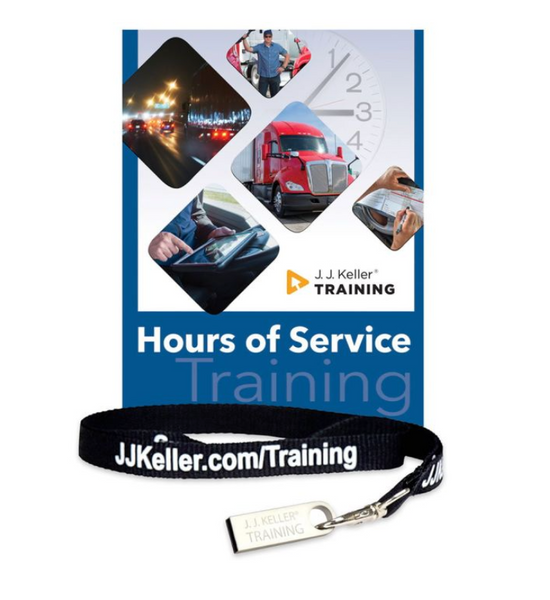Hours of Service Training - USB Training Program
$515.00
Product Details
The U.S. Department of Transportation's Federal Motor Carrier Safety Administration (FMCSA) has issued four significant Hours of Service (HOS) rule changes for interstate drivers — effective September 29, 2020.
The four new rule changes will improve safety, increase productivity, and increase flexibility for truck drivers:
- 30-minute breaks (§395.3(a)(3)) - Drivers can remain "on duty" for their breaks and not have to take a break until completing eight hours of driving time, rather than consecutive time.
- 100 air-mile exception (§395.1(e)(1)) - Drivers must be done working within 14 consecutive hours. Drivers must remain within a 150 air-mile radius.
- Split-sleeper provision (§395.1(g)(1)) - Drivers must spend at least 7 hours in a sleeper berth, plus another break to reach 10 hours total. Neither rest period counts against the 14-hour limit.
- Adverse conditions (§395.1(b)(1)) - Drivers may extend both their driving and on-duty limits by 2 hours.
The new Hours of Service Training program provides drivers with a thorough explanation of the Hours of Service Regulations, including how the rules help improve their safety and productivity.
- Note: Spanish videos will be available November 2020. Any customer who purchases the USB Training Program before November will automatically receive an updated USB with the Spanish videos when it's available.
- Intended Audience: Property-Carrying CMV Drivers
- Regs Covered: 49 CFR Part 395
- Ready-to-use training program includes several components
- English & Spanish available all in one program
- Closed-captioned for the hearing impaired
What's Included
-
(1) Full Video Program on USB - Combines engaging video and editing technology with expertise from industry professionals at all levels. Available in English & Spanish all in one program. Divided into six training modules:
-
Basics
- Who is Regulated?
- Purpose of the Hours-of-Service Regulations
- Working Time
- Your Impact on Hours-of-Service CSA BASIC Score
-
Limits
- Ill or Fatigued Operator
- 10-Hour Clock (Off-Duty)
- 14-Hour (On-Duty) Limit
- 11-Hour (Driving) Limit
- 60- and 70-Hour (On-Duty) Limit
- Interruption of Driving
- 34-Hour Restart
-
Recording Your Hours
- Trip Planning
- Coercion of Drivers Prohibited
- Supporting Documents
- Recording Duty Status
- Roadside Inspections Expectations
-
Exceptions
- Air-Mile Radius Short-Haul
- 16-Hour ("Big Day" Exception)
- Split-Sleeper Berth
- Adverse Driving Conditions
- Electronic Logging Devices (ELDs)
- Oil Field
- Agricultural Operations
- Utility Service Vehicles
- Personal Conveyance
- Other Exceptions
-
ELD Basics
- ELD Use
- Driver ELD Expectations
- Harassment Prevention
-
How to Complete a Manual Log
- Driver's Manual Log
- Record of Duty Status
-
Basics
-
(1) Trainer Guide - Provides basic information and guidelines trainers need to present Hours of Service training. Trainer Guides are provided in the following languages and formats:
- English
- 1 printed copy (not sold separately)
- 1 PDF (on the USB)
- Spanish
- 1 PDF (on the USB)
- English
- (11) Driver Handbooks - 10 English (Product Code: 61361) and 1 Spanish (Product Code: 61362) - Provide a full-color, portable, easy-to-understand reference to be used during and after training. Review key points and includes quizzes to check employees' understanding of the material.
- (1) Awareness Poster - 1 English printed copy and 1 Spanish PDF copy - A full-color, photo-based reminder to help driver be compliant with the Hours of Service rules
-
Trainer Tools on USB:
- Video Program*
- PowerPoint® presentations*
- Trainer Guides*
- Learning Activities with Answer Keys*
- Quizzes with Answer Keys*
- Photos
- Training Log
- Certificate of Completion*
- Awareness Poster*
*Available in both English and Spanish.
What's Covered
After completing Module 1: Basics, drivers will be able to:
- Identify who the hours-of-service regulations apply to
- Recognize the purpose of the hours-of-service regulations
- Differentiate between on-duty and off-duty activities
- Explain how hours-of-service violations affect driver and carrier CSA scores
After completing Module 2: Limits, drivers will be able to:
- Recognize how fatigue requires drivers to stop driving even if they have hours left to legally operate
- Identify off-duty activities that qualify as a 10-hour break
- Describe how the 14-hour limit is calculated
- Identify which duty status the 11-hour limit tracks
- Determine when to use the 60- or 70-hour limit
- Identify an exception which resets the 60- or 70-hour limit
- Explain how to satisfy the 30-minute break required under the interruption of driving provision
- Differentiate between cumulative and consecutive limits
After completing Module 3: Recording Your Hours, drivers will be able to:
- Describe how to use trip planning to achieve successful time management
- Identify two important components of coercion
- Explain how supporting documents are used to validate recorded hours
- Explain when to keep track of your hours using an ELD, manual log, or time record
- Recognize how roadside inspection expectations differ between ELDs, manual logs, and time records
After completing Module 4: Exceptions, drivers will be able to:
- Identify which drivers can use an hours-of-service exception
- Describe what an exception relieves a driver from
After completing Module 5: ELD Basics, drivers will be able to:
- Discuss when drivers are required to use an ELD
- Identify the five items required to be in the cab when recording hours with an ELD
- Describe how drivers can reduce unassigned drive time
- Explain the process to follow when their ELD malfunctions
- Differentiate between coercion and harassment
After completing Module 6: How to Fill Out Manual Logs, drivers will be able to:
- Identify required fields on a manual log
- Prepare a record of duty status using a manual log
- Describe how to complete a recap to determine the number of hours a driver has available before hitting the 60- or 70-hour limit


